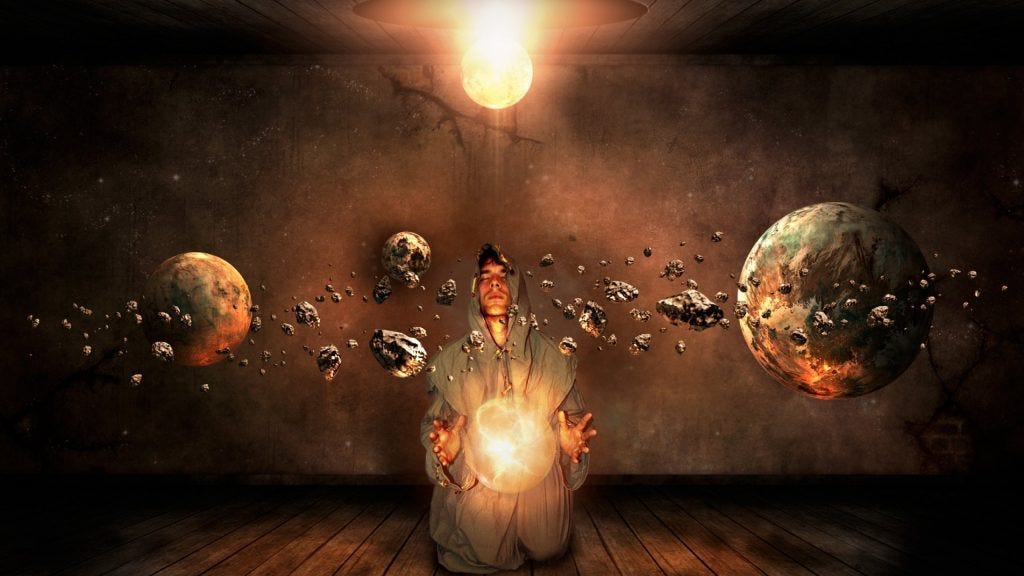What Is Magic?
Here is a nice frivolous question. If you’re like me, you’ve seen a fair number of books & movies that feature a phenomenon called “magic”. E.g., Gandalf and Harry Potter are wizards who cast magical spells to produce various interesting effects.
I have long wondered what this means. It seems like we understand the concept, but it’s not so clear when you try to explain it.
A paradigm example of a magic spell would be saying a few words and thereby causing, say, an apple pie to appear. Does this mean that when God supposedly created light by saying “let there be light”, he was casting a magical spell? I’ve certainly never heard this said, nor have I heard God described as a wizard. But maybe He is one anyway?
Anyway, what is it about the apple pie production that marks it as “magical”? Here are some ideas …
Accounts of Magic
(1) “Magic is producing an effect with no intelligible mechanism.”
No, that’s not right. This would mean that any fundamental causal relation is magical. (By definition, a fundamental causal relation has no deeper causal relations underlying it.) E.g., suppose it’s a fundamental law that a moving electric charge produces a magnetic field. Then that would be deemed “magical”. Indeed, I think it would become analytically true that all effects rely upon magic.
(2) “Magic is a power that lacks a scientific description, or fails to follow the laws of nature.”
These don’t seem right either. In stories that involve magic, the magic shows identifiable regularities. A skilled wizard can cast a spell and produce a predictable result. If a spell goes wrong, there is a reason, some flaw in the way it was cast. If this stuff was real, then someone could write down descriptions of these regularities, which could be empirically tested. Why wouldn’t this qualify as scientific description? And why wouldn’t the regularities discovered count as laws of nature?
(3) “Magic consists of producing effects in violation of the actual laws of nature.”
On this view, magical spells qualify as such because they violate our laws of nature, even though they presumably satisfy the laws of the fictional worlds in which they occur.
Problem: This would imply that Star Trek (and many other science fiction stories) is a story about magic. The faster-than-light travel of the Enterprise, I take it, violates our actual laws of nature.* But this isn’t generally considered magical. You might think this is because Star Trek posits alternative laws of nature in which the FTL travel makes sense. But see #2 above.
*For a counterpoint, see the Alcubierre Warp Drive: https://en.wikipedia.org/wiki/Alcubierre_drive.
(4) “Magic is a phenomenon by which mental states directly affect the physical world.”
That’s not right, because that implies that all of us use magic whenever we move our bodies. (Somewhere in your body is the first physical effect caused by your mental state. That would count as being “magically” produced.)
There does seem to be something to this, however – there is something weird about the mental causation involved in magic. Non-conscious things never originate magical effects, as far as I can recall. (Some inanimate objects are magical, but, as far as I can recall, these are always imbued with their powers by some conscious being.) When one casts a spell, one generally says certain words. But what makes a sound count as that word is some set of conventions and intentions in our minds.
In A Wizard of Earthsea, by the way, magic is invoked by speaking the “true tongue”, the language God spoke when creating the world. One exerts power over a thing by calling it by its true name. If this were a real phenomenon, it would be a very weird kind of causation. It would be as though the world itself were conscious and understood and responded to meanings just as we human beings do.
But again, I don’t know why this would count as magical, yet the behavior of actual conscious beings like us isn’t magical.
…
Those are all the accounts I can think of off hand. When I think about this, it seems like I really don’t know what “magic” means. This is worse than most concepts. As everyone knows, nearly all concepts are indefinable; however, in most cases, you can give an analysis that comes close to capturing the concept, where the counter-examples are all weird cases. In the case of “magic”, I can’t think of a prima facie plausible analysis that even gets the paradigm cases right.
Borderline Cases
Anyway, here are some cases that seem magic-like but not quite magic in the standard sense:
(a) God creating the world (+ everything else that He does).
(b) The powers used by superheroes.
They often include the sort of things that a wizard would do, but they’re not called “magic”.
(c) Use of the Force in the Star Wars universe.
(d) Telepathy, precognition, or other psychic powers. I don’t think they’re usually called magic, but I’m not sure why not.
More Accounts
This prompts me to entertain another theory about the nature of “magic”:
(5) “A power is magical only if it is labelled ‘magic’.”
Harry Potter is a story about magic (in part) because the wizards in that world call their powers “magic”. God’s creation of the world isn’t magic because it isn’t labelled that way in the Bible, nor by the people who believe in God in general.
Note that this is an “only if”: labelling something “magic” isn’t enough to make it magic. E.g., suppose I tell you a story about a world that is just like our world, except that in my imagined world, gravitation is magical. In this other world, gravitation makes planets orbit the sun, makes heavy objects fall to the Earth when dropped, etc., and it all satisfies Einstein’s field equations just like in our world. It’s just that in that world, this whole phenomenon is magical. Einstein’s equations are magically true, unlike in our world where they’re merely prosaic, scientific truths. Did I just succeed in describing a possible world with magic? (If yes, then how do we know our world isn't the magical one?)
I assume not. In general, I assume I can’t describe an alternative world in which some actual world phenomenon is exactly the way it is in the actual world except that it’s magical. If that were so, the concept “magical” would seem to be empty.
So being labelled “magic” should be merely a necessary, not a sufficient condition for counting as magic. Still, this would make possible weird pairs of cases, in which two possible phenomena are identical in all respects except that one counts as “magical”. E.g., imagine a series of stories exactly like the Star Wars stories, except that “the Force” is labelled “Magic”. The Dark Side of the Force is called “the Dark Side of Magic”, etc. According to (5), this story would depict a possible world containing magic, while the actual Star Wars stories do not, even though they’re substantively identical. This seems weird.
(6) “Magic is a fictitious natural kind.”
This is not a definition but nevertheless is an account of what might be going on. When you tell a story involving magic, you pretend that there is a specific phenomenon, having certain kinds of effects, where you pretend that there is some underlying essence of it, which in general is never actually specified in the story. If the story were true, there would be a definition of magic, because we could discover its underlying essence. But there is no definition in fact, because the author’s intentions aren’t sufficient to determine what the essence is.
So you could tell a story where, say, Thanos’ ability to kill half the universe isn’t magic, but maybe Dr. Strange’s powers are magic, by stipulation. Because there’s some underlying essence that explains Dr. Strange’s powers, and whatever it is, it isn’t the thing that explains Thanos’ ability.
In this case, magic stories might be coherent yet metaphysically impossible stories (in the way in which Kripke claims that unicorns are impossible). Roughly speaking, for any phenomenon in any possible world, that phenomenon isn’t really magic, because to be magic, it would have to have the essential property connected to the word “magic”, but our fictions have not specified what that property is, so there isn’t one.
Analogy: take a story with a fictitious element, say, Unobtainium. What is its atomic number? It doesn’t have one, because it’s not specified in the story. If you imagine a possible world in which, say, element number 120 is stable, that is not thereby a world in which element 120 is Unobtainium.* (If the story had said "unobtainium is element 120", then matters would be different. But assume it doesn't. Of course, someone could tell a new story in which that is specified, but we're asking about what the unobtainium of the original story is -- say, the unobtainium of the Avatar movie.)
Nor can you imagine a world in which, say, element 26 is Unobtainium, because element 26 is already necessarily iron. In general, there’s no way of describing an element that makes it count as Unobtainium. So that means that Unobtainium is a metaphysically impossible element.
That’s like the way in which magic is a metaphysically impossible phenomenon, on this last account.


